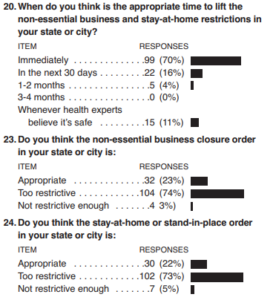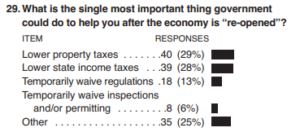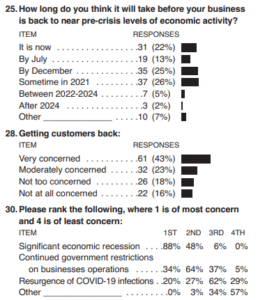“Exhausting financial resources before I can revive my business”
“Customers are too scared to come out of their house”
“Employees are not going to work because they can make more money on unemployment”
These quotes from small business owners show their extreme frustration operating in today’s COVID environment. Findings from a COVID survey reveal many are struggling to survive the fallout from Gov. Kelly’s shutdown order, and state policies aren’t helping them recover or bringing customers back.
A COVID survey of Kansas businesses, conducted by the National Federation of Independent Businesses, the Kansas Policy Institute, and the Gwartney Institute of Ottawa University uncovered these insights. The survey found several inconsistencies between what small business need and what state and local officials have done or will do. You can read the full survey here.
Policy Inconsistency #1: Lockdowns Were Too Restrictive
 To combat COVID-19, Governor Kelly classified individual businesses as “non-essential” and ordered them closed, starting in April. Additionally, the Governor ordered all other Kansans to stay home unless they needed to travel to businesses deemed “essential.” For most of May, the Governor phased out her “Ad Astra” restriction plan. Even though 90% of Kansas businesses polled were considered “essential,” 70% of those businesses felt stay-at-home restrictions in Kansas or their city should have been lifted immediately instead of a phasing-out. Nearly three-quarters of Kansas businesses polled thought closure orders were too restrictive.
To combat COVID-19, Governor Kelly classified individual businesses as “non-essential” and ordered them closed, starting in April. Additionally, the Governor ordered all other Kansans to stay home unless they needed to travel to businesses deemed “essential.” For most of May, the Governor phased out her “Ad Astra” restriction plan. Even though 90% of Kansas businesses polled were considered “essential,” 70% of those businesses felt stay-at-home restrictions in Kansas or their city should have been lifted immediately instead of a phasing-out. Nearly three-quarters of Kansas businesses polled thought closure orders were too restrictive.
At first glance, it could be hard to reconcile how “essential” businesses could have such strong negative views about closures for “non-essential” businesses. However, “essential” companies don’t operate in a vacuum. Quotes from COVID survey participants indicate how the government has overreached its authority, making it more challenging to operate.
“We fear government overstepping its authority to shut things down again.”
“This has been so misunderstood from the beginning and understandably so, but now there is no excuse. Let humans be humans and take care of themselves. We will live through it and get on with our lives now! Quit trying to control everyone.”
“The govt reaction is filled with overreach couples with paranoia. We can close down for every flu bug that shows up. It’s a fact of life. We have to learn to live with it.”
All businesses use many sorts of intermediate goods produced by other firms in the distant or recent past. The economy is an interconnected web and not isolated strings of supply chains. It does no good for “essential” businesses to get back to work if there’s no raw materials or labor for them to use.
Policy Inconsistency #2: Businesses want tax relief, not tax vetoes
 The COVID survey asked Kansas businesses “what is the single most important thing government could do to help you after the economy is ‘re-opened’?” Six percent of businesses thought waiving inspections and permitting would help. About 13% responded temporarily waiving regulations would be beneficial. One-quarter said “Other”. Governor Kelly did waive some medical occupational licensing restrictions, but most small businesses still face the full burden of state and local regulations.
The COVID survey asked Kansas businesses “what is the single most important thing government could do to help you after the economy is ‘re-opened’?” Six percent of businesses thought waiving inspections and permitting would help. About 13% responded temporarily waiving regulations would be beneficial. One-quarter said “Other”. Governor Kelly did waive some medical occupational licensing restrictions, but most small businesses still face the full burden of state and local regulations.
More than half of all businesses polled responded property or state income tax relief as the most critical policy for reopening. These responses fly contrary to the administrations’ response to tax relief. In 2019, Governor vetoed a Kansas income tax bill intended to adjust Kansas tax law to the 2017 Federal Tax Cuts and Jobs Act. This veto resulted in a tax increase for 90,000 Kansas taxpayers in 2019, and another 5,000 Kansas taxpayers in 2020. In 2020, Governor Kelly vetoed efforts to waive penalties on interest on property tax payments. She also vetoed property tax relief allowing local officials to raise taxes on Kansans without a public vote.
Policy Inconsistency #3: Businesses need customers back, but thinks government stokes COVID-19 fears.
 Unfortunately, 66% of businesses were either moderately or very concerned about getting customers back. To provide context, 40% of Kansas businesses don’t think they’ll return to pre-crisis levels until 2021. A significant recession is the number one concern with 88% ranking it first. “Continued government restrictions” was considered a 2nd concern by 66% of businesses. A third concern was the resurgence of COVID-19 infections by 62% of businesses.
Unfortunately, 66% of businesses were either moderately or very concerned about getting customers back. To provide context, 40% of Kansas businesses don’t think they’ll return to pre-crisis levels until 2021. A significant recession is the number one concern with 88% ranking it first. “Continued government restrictions” was considered a 2nd concern by 66% of businesses. A third concern was the resurgence of COVID-19 infections by 62% of businesses.
After Governor Kelly shuttered businesses closed on April 1st, it took another two months for the administration to process and provide small business relief funds. Now, after a month of reopening, Kansas health officials are threatening more business closures, shutdowns, and mandates due to rising COVID-19 cases. These unpredictable and capricious interventions perpetuate an environment of fear and thwarts the chance for a V-shaped economic recovery. Many firms voiced their concerns over an everlasting fear culture. Here are the comments provided by these firms.
“Government – particularly the state – using data regarding the virus to prolong “pandemic” controls. With increase in testing… confirmations will increase – there isn’t more disease. I want impact numbers on medical facilities to be protected but fear mongering.”
“Not having enough business due to COVID-19 fears”
“The government is using this alleged “pandemic” to manipulate the facts by skewed statistics for an outcome that benefits control of the ignorant and fearful general public.”
If the Kansas business community can’t recover, Kansas working and middle classes will suffer too. For a robust economic recovery, the COVID survey reveals businesses must have a chance to produce goods and services. To do so requires business planning in a shutdown-free environment. It needs lower taxes on that production and investment. Last but not least, it needs a stable policy regime that encourages customers to come back.




